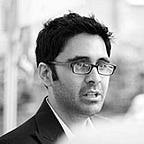How America Imploded
The Invisible Fist
When I began writing about economics, one curious set of facts immediately leapt out at me. A fact at odds with the theories and models I’d been taught – all of which said America was the exemplar of a successful economy, its platonic ideal.
Right around 1970, the more that I looked at the data, something seemed to go badly wrong with the US economy. Very badly wrong. Incomes began to flatline – and never recovered. Union participation shrank. Basic measures of well being like education, literacy, and health flatlined. Like an invisible fist had KO’d a society.
But why? What was different, special, about that date – 1970, or thereabouts?
Reality intruded, as it always does. The great financial crisis of 2007, which I’d been predicting, exploded. A Great Recession followed, and a recovery that wasn’t followed that, and then, just as I’d suspected, society shifted hard right in response to being abandoned by politicians all too happy to bail out bankers. Trump happened, Brexit happened. And I forgot all about the question I began with: 1970.
I was too young, and perhaps too idealistic, to see then what is all too obvious now.
What really happened to America? 1970 was roughly the year de jure segregation ended. We don’t need to debate the precise date, call it when you will. I date it to 1971, when segregated school buses were struck down by the Supreme Court. And it tells us a very powerful truth about life, economics, and America.
From slavery, through segregation, the US economy’s capital had a ready made supply of cheap labour. That is a crude way to put a barbaric human reality. People were exploited institutionally and systemically for profit is more accurate.
But in 1970 this supply of cheap labour suddenly began to come to an end. Now capital had to to pay higher costs. It couldn’t simply pool workers into two castes, one of whom was disposable, barely human at all. Exploitation was less efficient than it had been. How did the economy respond?
It simply shifted from exploiting one group of people to exploiting everyone as much as it could.
Union busting, overwork, and wage stagnation began in earnest. Then inflation for life’s basics caught fire: education, healthcare, and so on began to skyrocket in price. Quality of life began to fall.
Capitalism was quite literally eating itself. Without a supply of cheap labour, the US economy was doing the only thing it knew how to do: create another one. Except this time it was everyone, not just minorities. Of course it’s true to say minorities still face steep inequities. Yet what’s truer is that now everyone is exploited mercilessly by haywire capitalism.
In every life there is a past to be reckoned with. Pop psychologists say: forget your past! They are wrong. Until we come to face it’s reality, the past imprisons us. With its forged hope and desperate dreams.
We had a dream once, too. An American dream. But if we see the past carefully, we will see that it never was at all. The economy went from segregation to stagnation, seeking to replace cheap labour lost. The dream hides that ugly truth with a pretty lie, as all dreams of the past do.
Dreams of the past prevent us from having dreams about the future. And they are more necessary. For the past can’t be undone. If we are to have a new dream in America, then we must let the old one go. Even now the economy is still what it always was: a predatory machine creating cheap labour. But now it cannot itself afford to. The middle class imploded has nothing left to spend, save, invest. The machine is broken. The dream never was.
Having seen all that, now we can dream of the future. It should be one where capital isn’t merely seeking to exploit cheaper and cheaper labour until everyone is bankrupt but a few tycoons. By definition, no society can ever prosper that way. It should be one where capital is invested in public goods like healthcare and education that benefit everyone. That is what prosperity begins with.
(No, capital doesn’t “have” to do what it did in the US. Marx was wrong about that. In Canada, Sweden, the EU, capitalism and socialism work together quite happily. And those societies have prospered where the US has failed.)
Despite its talk of innovation and growth, the American economy is still what it always was. A predatory machine. It has never changed. That is the problem.
What has changed is us. There is no meat left to feed the monster with. And so now the challenge is simple: change it, or perish as society with it.
Umair
June 2017
